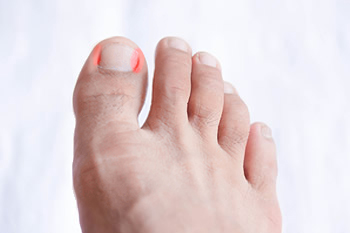Ainsley Roberson Rusevlyan, DPM
(252) 946-1181Washington, NC
 When the toenail curls downwards and into the skin surrounding the nail, it is referred to as an ingrown toenail. Common signs of an ingrown toenail include pain, redness, and swelling. Ingrown toenails can become infected if they are not treated. Ingrown toenails can form from a variety of reasons, such as shoes that are too tight, not properly trimming the toenails, excessively sweaty feet, or trauma to the toe. Patients who are struggling with an ingrown toenail may be able to find relief by soaking their feet in warm water for around 15 minutes a few times a day. However, ingrown toenails that persist should be looked at by a podiatrist in order to prevent an infection.
When the toenail curls downwards and into the skin surrounding the nail, it is referred to as an ingrown toenail. Common signs of an ingrown toenail include pain, redness, and swelling. Ingrown toenails can become infected if they are not treated. Ingrown toenails can form from a variety of reasons, such as shoes that are too tight, not properly trimming the toenails, excessively sweaty feet, or trauma to the toe. Patients who are struggling with an ingrown toenail may be able to find relief by soaking their feet in warm water for around 15 minutes a few times a day. However, ingrown toenails that persist should be looked at by a podiatrist in order to prevent an infection.
Ingrown toenails may initially present themselves as a minor discomfort, but they may progress into an infection in the skin without proper treatment. For more information about ingrown toenails, contact Ainsley Rusevlyan, DPM of InStride Roberson Footcare. Our doctor can provide the care you need to keep you pain-free and on your feet.
Ingrown Toenails
Ingrown toenails are caused when the corner or side of a toenail grows into the soft flesh surrounding it. They often result in redness, swelling, pain, and in some cases, infection. This condition typically affects the big toe and may recur if it is not treated properly.
Causes
You are more likely to develop an ingrown toenail if you are obese, have diabetes, arthritis, or have any fungal infection in your nails. Additionally, people who have foot or toe deformities are at a higher risk of developing an ingrown toenail.
Symptoms
Some symptoms of ingrown toenails are redness, swelling, and pain. In rare cases, there may be a yellowish drainage coming from the nail.
Treatment
Ignoring an ingrown toenail can have serious complications. Infections of the nail border can progress to a deeper soft-tissue infection, which can then turn into a bone infection. You should always speak with your podiatrist if you suspect you have an ingrown toenail, especially if you have diabetes or poor circulation.
If you have any questions, please feel free to contact our office located in Washington, NC . We offer the newest diagnostic and treatment technologies for all your foot care needs.
Read more about Ingrown Toenails